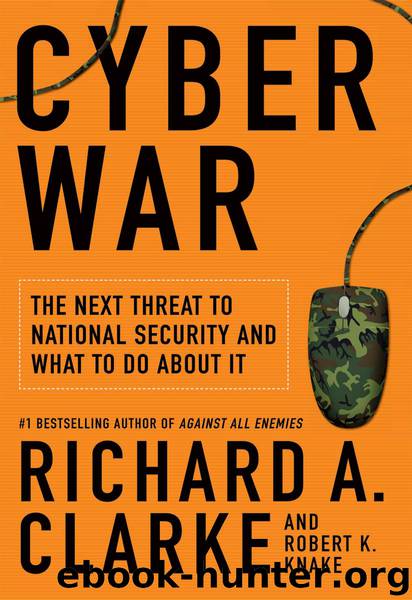Cyber War by Richard A. Clarke & Robert K. Knake

Author:Richard A. Clarke & Robert K. Knake
Language: eng
Format: epub
Publisher: HarperCollins
Published: 2010-04-17T04:00:00+00:00
1. THE GREATEST TRICK
The first reason you hear is that many cyber attacks that have happened have left behind no marks, no gaping crater like Manhattan’s Ground Zero. When private-sector firms have their core intellectual property stolen, they usually don’t even know it happened. To understand the problem that creates, imagine that you work in a museum with valuable objects, let’s say sculptures and paintings. When you leave the museum at the end of the day, you turn on an alarm system and make sure that the video recorder is running and is connected to the surveillance cameras. In the morning, you return. The alarm has not gone off overnight, but just to be sure, you scan through the video of the last twelve hours and satisfy yourself that no one was inside the museum while you were gone. Finally, you check all the sculptures and paintings to be sure that they are still there. All is well. Why ever would you then think you had a security problem?
That is essentially the situation that the Pentagon was facing in the late 1990s and continues to face today. There may be some low-level activity of people trying to penetrate their networks, but doesn’t the security software (firewalls, intrusion-detection systems, intrusion-prevention systems) deal effectively with most of the threats? Why would the brass think that their intellectual property, their crown jewels, war plans, engineering drawings, or software was now residing on hard drives in China, Russia, or anywhere other than just on their systems?
The difference between art thieves and world-class hackers is that with the best of the cyber thieves, you never know you were a victim. “Hell, the U.S. government does [number withheld] penetrations of foreign networks every month,” one intelligence official told me. “We never get caught. If we are not getting caught, what aren’t we catching when we’re guarding our own?” How do you convince someone that they have a problem when there is no evidence you can give them? The data isn’t missing like the Vermeer that was snatched from the Isabella Stewart Gardner Museum in Boston in 1990. This sounds like a new problem, unique to cyberspace. Historians of military intelligence, however, have heard this tale before.
In the Cold War the United States Navy was confident that it could defeat the Soviet naval forces if it ever came to a shooting war, until they learned that a family of Americans had given the Soviets a unique advantage. The Walker family, including an employee at the National Security Agency and his son in the U.S. Navy, had supplied the Soviets with the Navy’s top-secret codes, the cryptology that scrambled and unscrambled messages to and from our ships. The Red Navy knew where our ships were, where they were going, what they were ordered to do, and which major weapons and other systems onboard were not working. We were unaware that the Soviets knew these things because, although we assumed that they were intercepting our message traffic coming over radio frequencies, we were very confident that they could never unscramble our code.
Download
This site does not store any files on its server. We only index and link to content provided by other sites. Please contact the content providers to delete copyright contents if any and email us, we'll remove relevant links or contents immediately.
| Anthropology | Archaeology |
| Philosophy | Politics & Government |
| Social Sciences | Sociology |
| Women's Studies |
The Secret History by Donna Tartt(19012)
The Social Justice Warrior Handbook by Lisa De Pasquale(12179)
Thirteen Reasons Why by Jay Asher(8878)
This Is How You Lose Her by Junot Diaz(6866)
Weapons of Math Destruction by Cathy O'Neil(6253)
Zero to One by Peter Thiel(5778)
Beartown by Fredrik Backman(5723)
The Myth of the Strong Leader by Archie Brown(5488)
The Fire Next Time by James Baldwin(5420)
How Democracies Die by Steven Levitsky & Daniel Ziblatt(5207)
Promise Me, Dad by Joe Biden(5138)
Stone's Rules by Roger Stone(5072)
A Higher Loyalty: Truth, Lies, and Leadership by James Comey(4942)
100 Deadly Skills by Clint Emerson(4907)
Rise and Kill First by Ronen Bergman(4766)
Secrecy World by Jake Bernstein(4735)
The David Icke Guide to the Global Conspiracy (and how to end it) by David Icke(4693)
The Farm by Tom Rob Smith(4496)
The Doomsday Machine by Daniel Ellsberg(4477)
